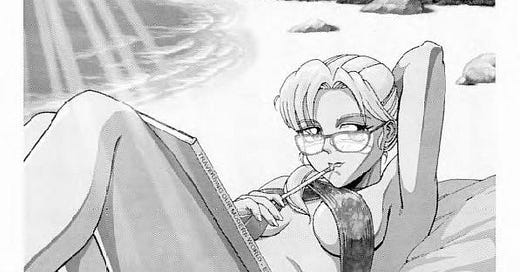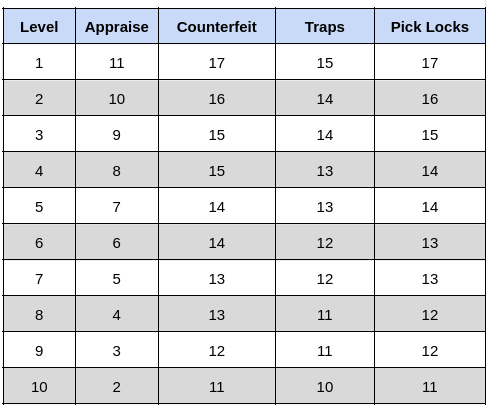The Rogue Scholar is another of the original Rifts O.C.C.s that I barely looked at over the years, overshadowed by flashier classes like the Juicer, Crazy, Glitter Boy, and Cyberknight. Its description takes up only about one full page. While gloriously brief compared to many other O.C.C.s that would come out in the World Books, I think it understates the exciting possibilities for this character.
Unfortunately, Erin Tarn, Rift’s quintessential example of the class, doesn’t do it much favors. (Victor Lazlo is also a Rogue Scholar, I believe, although he is also a multiclassing Parapsychologist and a psychic who tools around in powered armor, so he doesn’t count as a pure example.)
Really, you can tell everything about Erin Tarn by her picture:
Uh, wait a minute. That’s not the Erin Tarn I remember. Well, OK! Erin Tarn before she became an elderly Baby Boomer tenured Poli-Sci professor who won’t shut up about the historically unique evils of Donald Trump Emperor Prosek or all the years she spent digging latrines with the Peace Corps running from the Four Horsemen of the Apocalypse in Africa is probably OK.

Anyway, I thought I could spice up the class by zeroing in on the more exciting, Indiana Jones-esque influences and giving it some unique traits that would make it not only a fun class to play yourself, but the kind of character a group would be glad to have. I took plenty of inspiration from the Raiders of the Lost Artifacts OSR game, particularly the Treasure Hunter class, though I didn’t go full throttle on the pulpy man-of-action stats and abilities presented in, as I think the Rogue Scholar is a bit more bookish than all of that.
Rogue Scholar
Prime Attribute: INT
Prerequisites: 10+ INT
XP Bonus: Rogue Scholars earn +5% XP if they have an INT of 13-15, +10% if an INT of 16-17, or +15% if an INT of 18. See also the ‘Journal Writing’ special rule below.
Progression:
Skills
All Rogue Scholars have four skills.The numbers listed in the table is the target number (TN) that needs to be matched or exceeded on a D20 in order for the skill to be successful. These rolls are modified by any bonuses or penalties listed. If a roll to Appraise, Counterfeit, or PIck Locks fails, it may not be attempted on the same object until the character has gone up a level. If a Detect/Disable Traps roll is failed, the trap is sprung immediately.
Appraise: The character can accurately assess the value of any treasure or artifacts on the open market. This does not necessarily mean he will get that price, however. (Applicable Stat: WIS)
Create/Detect Counterfeit: The lucrative trade in artifacts from the Before Times inspires fraud. The same attention that allows wary scholars to detect counterfeits also allows them the knowledge to create convincing frauds themselves. (Applicable Stat: INT)
Detect/Disable Traps: If a detected trap is to be disarmed, a separate roll is required. (Applicable Stat: DEX)
Pick Locks: Many adventurers become skilled at defeating a variety of different locks of different eras and styles. Requires lockpicking equipment. Does not work on magic locks. (Applicable Stat: DEX)
Special Abilities:
Polyglot: All scholars begin the game able to speak one additional language than they otherwise would (they also get to know an additional language for every rank of INT bonus, as usual). If the language has a known script, they will also be literate in that language. If the character chooses a ‘dead’ language, or a language not spoken, then at the GM’s discretion they will be able to read it but not necessarily speak it fluently, or at all. Provided they have the means to do so, they can also learn an additional language at Levels 3, 6, and 9.
Cultural Literacy: At level 5, a Rogue Scholar has seen or read about enough of the world that he will be able to offer reliable guidance about how to speak, dress, and behave around different communities. As a result, any CHA-based tests (such as for recruiting henchmen or bargaining for trade) automatically come in at one level higher than the roll would indicate.
Journal Writing: Although it makes their life more dangerous, many Rogue Scholars seek public notoriety by chronicling their adventures, either in the (very few) academic journals circulating or, more likely, in popular, semi-fictionalized broadsheets or pamphlets. If, at the end of an adventure, the player writes up an exciting recounting of their tale, the character will gain an additional +5% bonus to XP.
Raconteur: Rogue Scholars are eager to share interesting bits of folklore, mythology, and history to anyone who will listen. They gain a +1 bonus per level to all CHA rolls when they have the chance to entertain an audience or get to know someone with a lengthy conversation.
Moldy Maps and Dusty Tomes: Even if they’ve never been there personally, odds are that a Rogue Scholar has seen a lot of the world in old books and maps. If the character succeeds in an INT Saving Throw, then the GM should provide him with a rudimentary but reasonably useful map of the wilderness region or city they intend to travel in. Since the maps the character has seen will likely be years (or even centuries!) out of date, there will likely be many surprises, but at least the general distances, orientation, terrain features, and landmarks (even if they only persist as ruins) should be generally correct. I
In addition, a successful roll will provide the character with 1D4 + Level ‘Facts’ about the area, with at least a number equal to the character’s Level being true. Treat these like rumors/adventure hooks picked up at a tavern.
Note that this Saving Throw is not subject to any re-rolls. If it’s failed, then the character has no useful prior knowledge of the area in question.
As always, I’d be delighted to hear your thoughts, especially if you’ve used it in your own game.







Roll to know something about the dungeon is an interesting formalization of the collaborative banter based world building of an Appendix A random dungeon.
"You see a crumbling statue of what looks like a crocodile standing on two legs."
"Oh shit, bet there's serpent men here."
<Thinking>There are now.</Thinking>